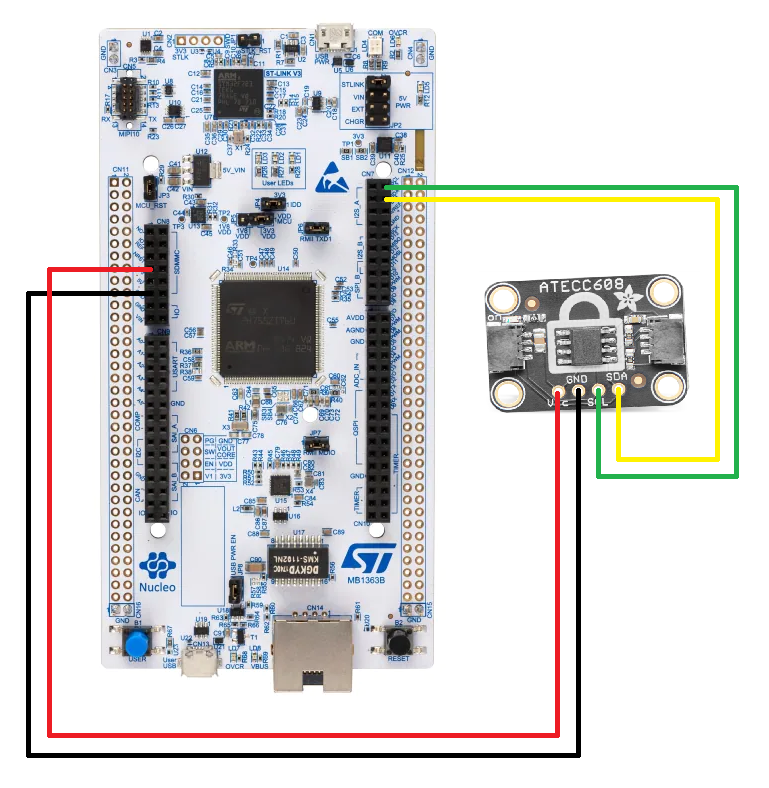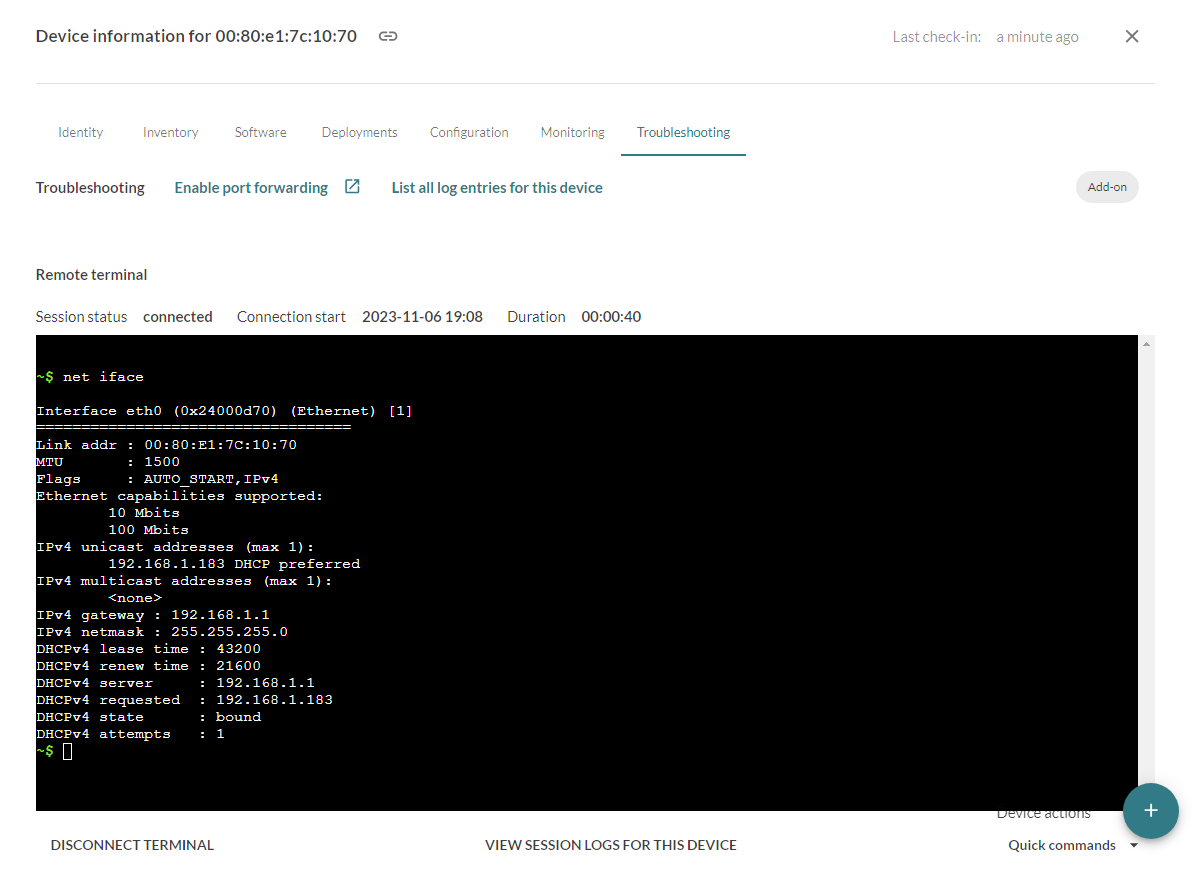Mender MCU client is an open source over-the-air (OTA) library updater for MCU devices. This demonstration project runs on STM32H7 hardware using Zephyr RTOS. Authentication of the device with Mender server is achieved using an ATECC608 secure element.
This project is used with a NUCLEO-H745ZI-Q evaluation board and an ATECC608 secure element (both ATECC608A and ATECC608B are compatible, ATECC608B is recommended for new designs). The device tree overlay nucleo_h745zi_q_m7_firmware.overlay specifies the wiring of the secure element, as illustrated on the following image, and it is possible to adapt it to your own hardware.
The project is built using Zephyr RTOS v3.7.x (v3.7-branch) and Zephyr SDK >= v0.16.0. It depends on cJSON and a specific fork of Microchip cryptoauthlib that support Zephyr integration. There is no other dependencies.
To start using Mender, we recommend that you begin with the Getting started section in the Mender documentation.
To start using Zephyr, we recommend that you begin with the Getting started section in the Zephyr documentation. It is highly recommended to be familiar with Zephyr environment and tools to use this example.
Clone the project and retrieve submodules using git submodule update --init --recursive.
Then open a new Zephyr virtual environment terminal.
The example application should first be configured to set at least:
CONFIG_MENDER_SERVER_TENANT_TOKENto set the Tenant Token of your account on "https://hosted.mender.io" server.
You may want to customize few interesting settings:
CONFIG_MENDER_SERVER_HOSTif using your own Mender server instance. Tenant Token is not required in this case.CONFIG_MENDER_CLIENT_AUTHENTICATION_POLL_INTERVALis the interval to retry authentication on the mender server.CONFIG_MENDER_CLIENT_UPDATE_POLL_INTERVALis the interval to check for new deployments.CONFIG_MENDER_CLIENT_INVENTORY_REFRESH_INTERVALis the interval to publish inventory data.CONFIG_MENDER_CLIENT_CONFIGURE_REFRESH_INTERVALis the interval to refresh device configuration.
Other settings are available in the Kconfig. You can also refer to the mender-mcu-client API and configuration keys.
Particularly, it is possible to activate the Device Troubleshoot add-on that will permit to display the Zephyr console of the device directly on the Mender interface as shown on the following screenshot.
In order to get the Device Troubleshoot add-on working, the following configuration keys must be defined in the prj.conf file:
CONFIG_HEAP_MEM_POOL_SIZE=1500
CONFIG_ZVFS_OPEN_MAX=16
CONFIG_SHELL_BACKEND_SERIAL=n
CONFIG_SHELL_AUTOSTART=n
CONFIG_SHELL_STACK_SIZE=3072
The application relies on mcuboot and requires to build a signed binary file to be flashed on the evaluation board.
Use the following commands to build and flash mcuboot (please adapt the paths to your own installation):
west build -s $HOME/zephyrproject/bootloader/mcuboot/boot/zephyr -d build-mcuboot -b nucleo_h745zi_q/stm32h745xx/m7 -- -DDTC_OVERLAY_FILE=path/to/mender-stm32h745-zephyr-example/nucleo_h745zi_q_m7_mcuboot.overlay -DCONFIG_BOOT_SWAP_USING_SCRATCH=y -DCONFIG_BOOT_MAX_IMG_SECTORS=3
west flash -d build-mcuboot
Use the following command to build, sign and flash the application (please adapt the paths to your own installation):
west build -b nucleo_h745zi_q/stm32h745xx/m7 path/to/mender-stm32h745-zephyr-example
west flash --hex-file build/zephyr/zephyr.signed.hex
After flashing the application on the NUCLEO-H745ZI-Q evaluation board and displaying logs, press RESET button on the evaluation board (the target is halted by default) and you should be able to see the following:
*** Booting MCUboot v2.1.0-rc1-36-gfb2cf0ec3da3 ***
*** Using Zephyr OS build v3.7.0 ***
I: Starting bootloader
I: Primary image: magic=unset, swap_type=0x1, copy_done=0x3, image_ok=0x3
I: Scratch: magic=unset, swap_type=0x1, copy_done=0x3, image_ok=0x3
I: Boot source: primary slot
I: Image index: 0, Swap type: none
I: Bootloader chainload address offset: 0x20000
I: Jumping to the first image slot
[00:00:03.759,000] <inf> phy_mii: PHY (0) Link speed 100 Mb, full duplex
[00:00:04.061,000] <inf> mender_stm32h745_zephyr_example: IPv4 address: 192.168.1.183
[00:00:04.071,000] <inf> mender_stm32h745_zephyr_example: Lease time: 43200 seconds
[00:00:04.081,000] <inf> mender_stm32h745_zephyr_example: Subnet: 255.255.255.0
[00:00:04.091,000] <inf> mender_stm32h745_zephyr_example: Router: 192.168.1.1
[00:00:04.105,000] <inf> mender_stm32h745_zephyr_example: MAC address of the device '00:80:e1:7c:10:70'
[00:00:04.117,000] <inf> mender_stm32h745_zephyr_example: Running project 'mender-stm32h745-zephyr-example' version '0.1.0'
[00:00:04.136,000] <inf> mender: CMAKE_SOURCE_DIR/components/mender-mcu-client/platform/tls/generic/cryptoauthlib/src/mender-tls.c (82): Secure element revision information: '00006002'
[00:00:04.154,000] <inf> mender: CMAKE_SOURCE_DIR/components/mender-mcu-client/platform/tls/generic/cryptoauthlib/src/mender-tls.c (84): Secure element is an ATECC608A
[00:00:04.177,000] <inf> mender: CMAKE_SOURCE_DIR/components/mender-mcu-client/platform/tls/generic/cryptoauthlib/src/mender-tls.c (94): Secure element serial number is: '012348ea3966ea9eee'
[00:00:04.200,000] <inf> mender_stm32h745_zephyr_example: Mender client initialized
[00:00:04.210,000] <inf> mender: CMAKE_SOURCE_DIR/src/mender-storage.c (157): Device configuration not available
[00:00:04.223,000] <inf> mender_stm32h745_zephyr_example: Mender configure add-on registered
[00:00:04.234,000] <inf> mender_stm32h745_zephyr_example: Mender inventory add-on registered
[00:00:04.245,000] <inf> mender_stm32h745_zephyr_example: Device configuration retrieved
[00:00:04.307,000] <inf> mender: CMAKE_SOURCE_DIR/src/mender-storage.c (102): Deployment data not available
[00:00:04.319,000] <inf> mender_stm32h745_zephyr_example: Mender client connect network
[00:00:07.590,000] <err> mender: CMAKE_SOURCE_DIR/components/mender-mcu-client/core/src/mender-api.c (900): [401] Unauthorized: dev auth: unauthorized
[00:00:07.606,000] <inf> mender_stm32h745_zephyr_example: Mender client authentication failed
[00:00:07.617,000] <inf> mender_stm32h745_zephyr_example: Mender client released network
You now have to accept your device on the mender interface. Once it is accepted on the mender interface the following will be displayed:
[00:10:04.256,000] <inf> mender_stm32h745_zephyr_example: Mender client connect network
[00:10:07.632,000] <inf> mender_stm32h745_zephyr_example: Mender client authenticated
[00:10:07.643,000] <inf> mender: CMAKE_SOURCE_DIR/components/mender-mcu-client/core/src/mender-client.c (884): Checking for deployment...
[00:10:10.305,000] <inf> mender: CMAKE_SOURCE_DIR/components/mender-mcu-client/core/src/mender-client.c (892): No deployment available
[00:10:10.320,000] <inf> mender_stm32h745_zephyr_example: Mender client released network
[00:10:10.330,000] <inf> mender_stm32h745_zephyr_example: Mender client connect network
[00:10:12.966,000] <inf> mender_stm32h745_zephyr_example: Mender client released network
[00:10:12.977,000] <inf> mender_stm32h745_zephyr_example: Mender client connect network
[00:10:15.621,000] <inf> mender_stm32h745_zephyr_example: Mender client released network
Congratulation! Your device is connected to the mender server. Device type is mender-stm32h745-zephyr-example and the current software version is displayed.
First retrieve mender-artifact tool.
Change VERSION file to VERSION_MAJOR=0 and VERSION_MINOR=2, rebuild and sign the firmware using the following commands. We previously used hex file because it is required to flash the device, but we now use bin file that is required for the mender-mcu-client:
west build -b nucleo_h745zi_q/stm32h745xx/m7 path/to/mender-stm32h745-zephyr-example
Then create a new artifact using the following command line:
path/to/mender-artifact write rootfs-image --compression none --device-type mender-stm32h745-zephyr-example --artifact-name mender-stm32h745-zephyr-example-v0.2.0 --output-path build/zephyr/mender-stm32h745-zephyr-example-v0.2.0.mender --file build/zephyr/zephyr.signed.bin
Upload the artifact mender-stm32h745-zephyr-example-v0.2.0.mender to the mender server and create a new deployment.
The device checks for the new deployment, downloads the artifact and installs it on the slot1_partition. Then it reboots to apply the update:
[00:10:04.249,000] <inf> mender_stm32h745_zephyr_example: Mender client connect network
[00:10:04.260,000] <inf> mender: CMAKE_SOURCE_DIR/components/mender-mcu-client/core/src/mender-client.c (884): Checking for deployment...
[00:10:06.502,000] <inf> mender: CMAKE_SOURCE_DIR/components/mender-mcu-client/core/src/mender-client.c (918): Downloading deployment artifact with id '0ecb3633-f53e-45a8-9bac-930e7f47dbd9', artifact name 'mender-stm32h745-zephyr-example-v0.2.0' and uri 'https://hosted-mender-artifacts.s3.amazonaws.com/6370b06a7f0deaedb279fb6a/d11d9097-a6e9-4cb1-92be-b474e6a51524?
[00:10:08.566,000] <inf> mender_stm32h745_zephyr_example: Deployment status is 'downloading'
[00:10:11.106,000] <inf> mender: CMAKE_SOURCE_DIR/components/mender-mcu-client/core/src/mender-artifact.c (382): Artifact has valid version
[00:10:12.008,000] <inf> mender: CMAKE_SOURCE_DIR/components/mender-mcu-client/platform/flash/zephyr/src/mender-flash.c (42): Start flashing artifact 'zephyr.signed.bin' with size 303472
[00:10:30.073,000] <inf> mender: CMAKE_SOURCE_DIR/components/mender-mcu-client/core/src/mender-client.c (930): Download done, installing artifact
[00:10:32.066,000] <inf> mender_stm32h745_zephyr_example: Deployment status is 'installing'
[00:10:34.096,000] <inf> mender_stm32h745_zephyr_example: Deployment status is 'rebooting'
[00:10:34.107,000] <inf> mender_stm32h745_zephyr_example: Mender client released network
[00:10:34.118,000] <inf> mender_stm32h745_zephyr_example: Restarting system
uart:~$ *** Booting MCUboot v2.1.0-rc1-36-gfb2cf0ec3da3 ***
*** Using Zephyr OS build v3.7.0 ***
I: Starting bootloader
I: Primary image: magic=unset, swap_type=0x1, copy_done=0x3, image_ok=0x3
I: Scratch: magic=bad, swap_type=0x1, copy_done=0x2, image_ok=0x1
I: Boot source: primary slot
I: Image index: 0, Swap type: test
I: Starting swap using scratch algorithm.
I: Bootloader chainload address offset: 0x20000
I: Jumping to the first image slot
[00:00:03.654,000] <inf> phy_mii: PHY (0) Link speed 100 Mb, full duplex
[00:00:03.705,000] <inf> mender_stm32h745_zephyr_example: IPv4 address: 192.168.1.183
[00:00:03.716,000] <inf> mender_stm32h745_zephyr_example: Lease time: 43200 seconds
[00:00:03.726,000] <inf> mender_stm32h745_zephyr_example: Subnet: 255.255.255.0
[00:00:03.736,000] <inf> mender_stm32h745_zephyr_example: Router: 192.168.1.1
[00:00:03.750,000] <inf> mender_stm32h745_zephyr_example: MAC address of the device '00:80:e1:7c:10:70'
[00:00:03.762,000] <inf> mender_stm32h745_zephyr_example: Running project 'mender-stm32h745-zephyr-example' version '0.2.0'
[00:00:03.780,000] <inf> mender: CMAKE_SOURCE_DIR/components/mender-mcu-client/platform/tls/generic/cryptoauthlib/src/mender-tls.c (82): Secure element revision information: '00006002'
[00:00:03.799,000] <inf> mender: CMAKE_SOURCE_DIR/components/mender-mcu-client/platform/tls/generic/cryptoauthlib/src/mender-tls.c (84): Secure element is an ATECC608A
[00:00:03.821,000] <inf> mender: CMAKE_SOURCE_DIR/components/mender-mcu-client/platform/tls/generic/cryptoauthlib/src/mender-tls.c (94): Secure element serial number is: '012348ea3966ea9eee'
[00:00:03.844,000] <inf> mender_stm32h745_zephyr_example: Mender client initialized
[00:00:03.854,000] <inf> mender: CMAKE_SOURCE_DIR/src/mender-storage.c (159): Device configuration not available
[00:00:03.867,000] <inf> mender_stm32h745_zephyr_example: Mender configure add-on registered
[00:00:03.878,000] <inf> mender_stm32h745_zephyr_example: Mender inventory add-on registered
[00:00:03.889,000] <inf> mender_stm32h745_zephyr_example: Device configuration retrieved
[00:00:03.951,000] <inf> mender_stm32h745_zephyr_example: Mender client connect network
[00:00:06.144,000] <inf> mender_stm32h745_zephyr_example: Mender client authenticated
[00:00:06.155,000] <inf> mender: CMAKE_SOURCE_DIR/components/mender-mcu-client/platform/flash/zephyr/src/mender-flash.c (146): Application has been mark valid and rollback canceled
[00:00:08.286,000] <inf> mender_stm32h745_zephyr_example: Deployment status is 'success'
[00:00:08.296,000] <inf> mender: CMAKE_SOURCE_DIR/components/mender-mcu-client/core/src/mender-client.c (884): Checking for deployment...
[00:00:10.308,000] <inf> mender: CMAKE_SOURCE_DIR/components/mender-mcu-client/core/src/mender-client.c (892): No deployment available
[00:00:10.322,000] <inf> mender_stm32h745_zephyr_example: Mender client released network
[00:00:10.333,000] <inf> mender_stm32h745_zephyr_example: Mender client connect network
[00:00:12.303,000] <inf> mender_stm32h745_zephyr_example: Mender client released network
[00:00:12.314,000] <inf> mender_stm32h745_zephyr_example: Mender client connect network
[00:00:14.296,000] <inf> mender_stm32h745_zephyr_example: Mender client released network
Congratulation! You have updated the device. Mender server displays the success of the deployment.
In case of failure to connect and authenticate to the server the current example application performs a rollback to the previous release. You can customize the behavior of the example application to add your own checks and perform the rollback in case the tests fail.
The Device Troubleshoot add-on permits to display the Zephyr Shell on the Mender interface. Autocompletion and colors are available.
The zephyr integration into the mender-mcu-client is generic and it is not limited to STM32 MCUs. Several points discussed below should be taken into consideration to use an other hardware, including evaluation boards with other MCU families.
The flash sector size is an important criteria to select an evaluation board. The STM32H745ZI MCU has 128KB sectors, which is not convenient at all to define a custom layout.
In the current example, this constraints the flash layout to a single sector to store the bootloader, and 3 sectors for each slots. The last sector is not used, loosing 128KB of memory.
What remains important is that partitions are aligned on sectors. Moreover slot0_partition and slot1_partition must have the same size.
NVS module from Zephyr requires sectors to be 64KB or less in size, which is not compatible with the STM32H745ZI MCU. Moreover it requires at least 3 sectors.
In the current example, authentication keys are not saved in the mender storage area because they are managed by the ATECC608 secure element. Instead, only deployment data is used when an update is done, and device configuration if it is defined.
Implementation has been done using the backup sram available in the STM32H745ZI MCU. Because this is specific and not supported by the mender-mcu-client, CONFIG_MENDER_PLATFORM_STORAGE_TYPE_WEAK has been defined and project specific implementation has been done. See src/mender-storage.c for more information.
The ATECC608 is used within the Microchip cryptoauthlib library. It is supposed the secure element is provisioned before starting the application.
I have personally used the esp_cryptoauth_utility to provisioned the device.
Finally note that a fork of the official Microchip cryptoauthlib is used to have up to date Zephyr integration. This is done until the following Pull Requests to the original repository are pending:
The communication with the server is done using HTTPS. To get it working, the Root CA that is providing the server certificate should be integrated and registered in the application (see tls_credential_add in the src/main.c file). Format of the expected Root CA certificate is DER.
In this example we are using the https://hosted.mender.io server. While checking the details of the server certificate in your browser, you will see that is is provided by Amazon Root CA 1. Thus the Amazon Root CA 1 certificate AmazonRootCA1.cer retrieved at https://www.amazontrust.com/repository is integrated in the application.
Copyright joelguittet and mender-mcu-client contributors
Licensed under the Apache License, Version 2.0 (the "License"); you may not use this file except in compliance with the License. You may obtain a copy of the License at
http://www.apache.org/licenses/LICENSE-2.0
Unless required by applicable law or agreed to in writing, software distributed under the License is distributed on an "AS IS" BASIS, WITHOUT WARRANTIES OR CONDITIONS OF ANY KIND, either express or implied. See the License for the specific language governing permissions and limitations under the License.



